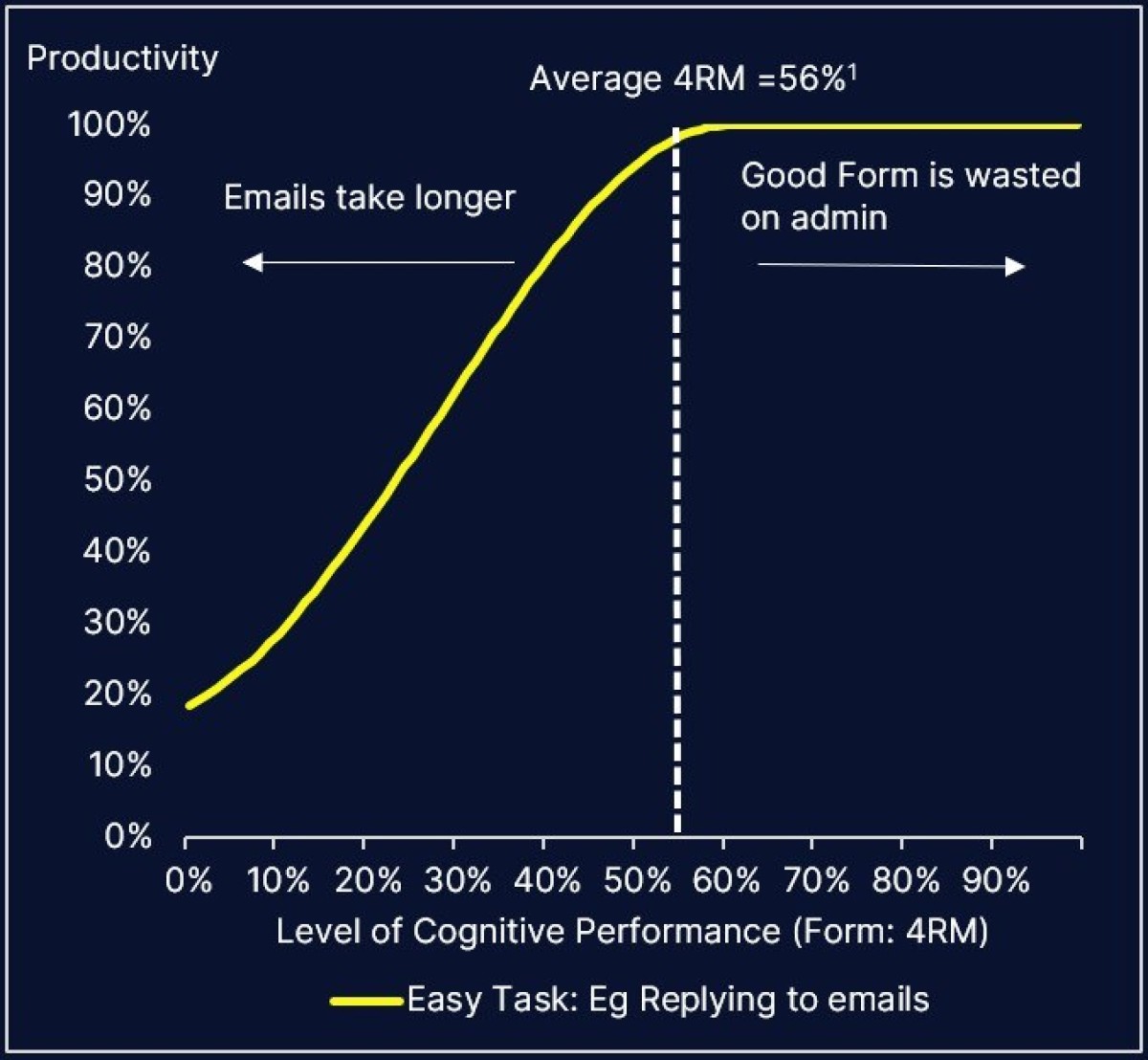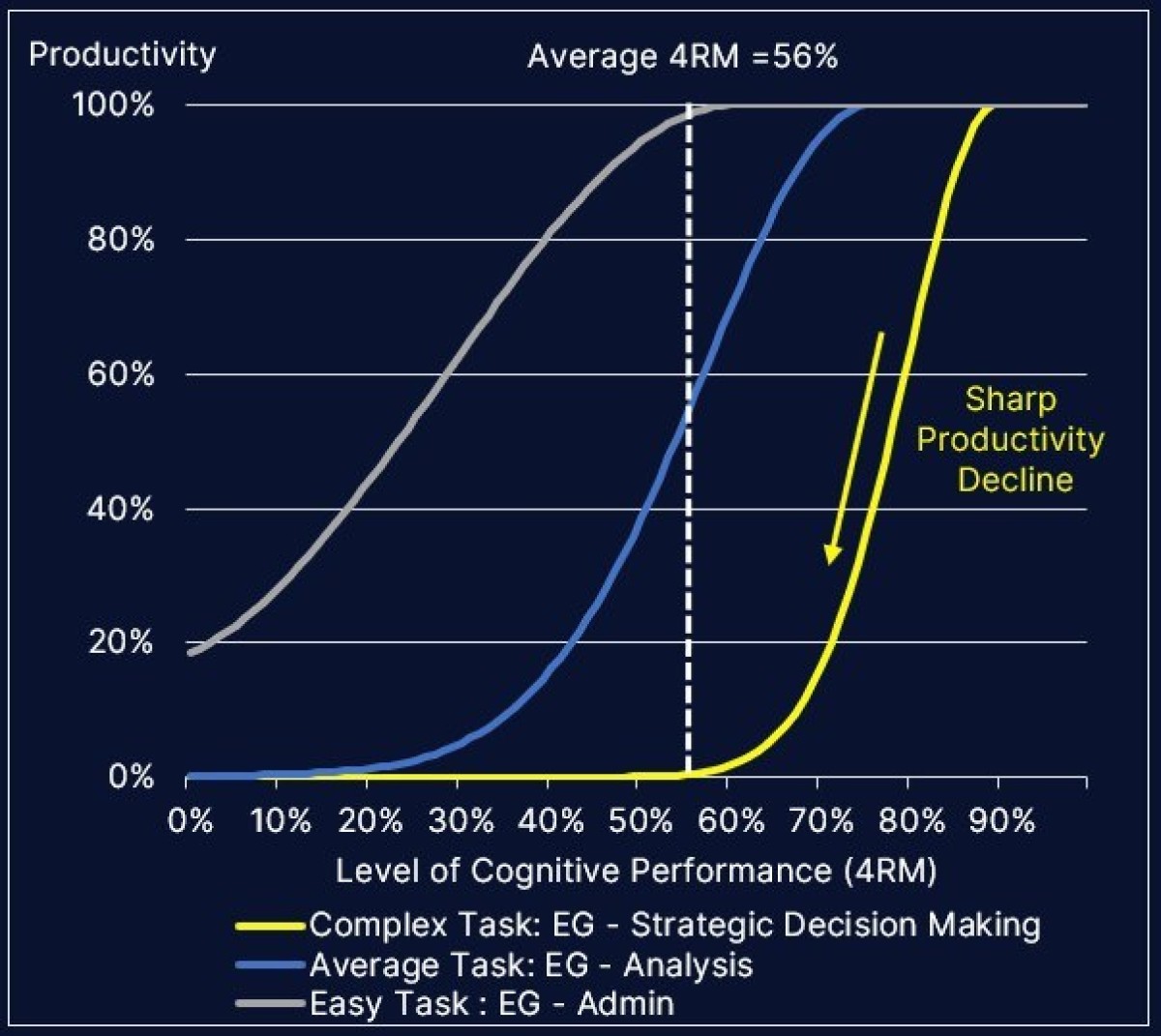Understanding Knowledge Worker Productivity
How To Achieve More By Doing Less
If you think for a living, it’s almost certain that, a.) some aspects of your role are cognitively demanding, b.) there are occasions when your brain isn’t functioning at the level required to complete these demanding tasks effectively, and c.) performing these demanding tasks well is the key to making a real impact and successfully achieving your goals.
This article takes an analytical approach to examine the relationship between performance and productivity in cognitively demanding roles and explores practical ways in which ‘knowledge-workers’ can achieve more by focussing on performing better instead of working harder.
A Flawed Assumption About Productivity
In simple terms:
Output, AKA ‘Business Impact’ = Productivity X Time
The default response to being busy is to simply work harder. Without thinking, we make the lazy assumption that our productivity is constant and conclude that to achieve more we just need to work longer.
For manual tasks that don’t require much brain power, productivity is indeed constant. The only way to increase output is to work for longer.
For cognitively demanding tasks however, for example solving complex problems, the inverse is true. If we are not performing well, we simply can’t complete the task, irrespective of how much time we spend trying. The only way to increase output, to add value to the business, is to increase our ability to be productive, and what that really means is to perform better.
For knowledge workers, making the simple, invalid assumption, that productivity is constant and focussing blindly on working harder to achieve more can have profound negative consequences.
The Productivity/Performance Curve
The productivity/performance curve looks in more detail at how for a given task, our overall productivity (read 'business impact per unit of time') changes depending on our level cognitive performance (or 4RM®, pronounced ‘Form’, our proprietary measure of how well we are mentally performing at any moment relative to our best).
The first thing to observe is that even for the most basic knowledge worker tasks, a degree of thought is required, and hence productivity is not constant, it varies based on our cognitive performance. See Figure 1 below. For routine tasks, such as replying to emails, we can be fully productive when we are on average Form1 but when our Form dips noticeably we become less productive. We are still capable of completing the task to a reasonable standard, but we are less efficient. We can either maintain the same level of quality and take longer over it, or we can clear our inbox in the same time but let the quality drop (or some combination of the two). Either way our productivity declines.

Figure 1: Productivity/Performance Curve for a simple knowledge worker task
1 The average leader taking part in OwnLife tracking records operating at an average 56% of their peak cognitive performance, or 4RM.
When it comes to more the challenging aspects of our jobs, not only do we need to be on higher levels of Form to be fully productive, but the rate at which we become unproductive as our Form dips accelerates sharply.
Looking at the illustrative example in Figure 2 below, you can see that for a really complex task, we can only be fully productive when we are operating close to our very best, and that our ability to deliver positive business impact (productivity) drops off very quickly when our Form drops below 90%. If we drop to being only on average Form ~50%, we aren’t half as productive, we cease to be productive at all!

Death By Busyness
By working harder to increase output, not only is the focus misplaced because the effort would be better spent focussing on increasing productivity, but 9 times out of 10, working harder tends to directly lower our cognitive performance, and hence have a magnified effect in lowering productivity. Note that in the above example, for a cognitively demanding task, a 10%-point drop in Form from 80% to 70%, takes us from being somewhat productive (59% productivity) to almost useless (14% productivity)!
Whenever we start to feel under water or out of control the first, second and third thing we should be doing is investing in whatever actions are going to help us perform better.
What tends to happen is the exact opposite. When we start to feel out of control the first things we sacrifice are the things that help us perform optimally. We focus on finding more time to work by borrowing the ‘time’ from the activities which are foundational in helping us perform well. As soon as a deadline comes up or we start feeling swamped, we cut out the time to exercise, the time to take a break, the time to eat healthily, the time to go to bed early, and we fill it with work. We have countless people join our programmes who say, ‘I don’t have time to do any exercise or take breaks’, and before my burnout in 2009 my mindset was exactly the same.
Often the real underlying cause of us being busy is not that we suddenly have more to do, but that we are not able to perform at the level required to do the things that are really important. As a result we start to feel out of control and focus on working harder, but because we still aren’t able to do the really demanding and important things, we focus on doing more of the low value tasks that we are still able to be productive with. Sure, these will have some value, but they can end up being work for work’s sake. The more stressed and out of control we get, the more we can end up focussing on the wrong things.
Whilst staying late for a couple of nights to meet a deadline certainly can help increase output in the very short term, over time that mindset can build to ‘I don’t have time to look after myself’ or ‘I am too busy to do anything other than work and sleep’, and if this takes hold it can lead to a death spiral of working harder, performing worse, becoming less productive and thus more busy, leading to further self-neglect, chronic stress and ultimately burnout.
It's really important here to distinguish between work/life balance and work/Form balance. Work/life balance is a very broad term encompassing spending time with one’s family and doing things you find personally fulfilling outside of work. There are stages in one’s career where it is rational to make a conscious choice to move this balance slightly in favour of work for a period of time. When it comes to work/Form balance however this is never the case, because as we have outlined above, work comes through being on great Form.
Don’t ever make the mistake of confusing the two and think that by doing the things you need to perform optimally or asking your boss for time for a break or to do some exercise, you are signalling a bad work ethic, quite the contrary. Articulated well, these are a sign of a commitment to perform.
Practical Action Points
1. Focus on spending more time on peak form (and use it for the highest impact items on your to do list)
The things that are going to advance your career, the things which are really going to differentiate you and the things that make the best use of your unique talent, are the most cognitively demanding aspects of your role. You aren’t going to differentiate yourself or be remembered for being really good at admin. Nobody can be on peak Form all day but if you can spend some time on peak Form most days, and you don’t waste that time on low value activities but spend it solving the really important and demanding issues, you have the best chance of maximising your impact.
2. Remember small changes in lifestyle translate to big changes in productivity
Every time you make a decision to optimise your lifestyle and improve your cognitive performance, you are having a leveraged effect in increasing your impact. The productivity/performance curve works in your favour, especially for the most important/demanding aspects of your role. You can permanently change your mindset quite quickly and once you do that, building sustainable, incrementally positive routines will have an immediate and cumulative benefit.
Summary
There has never been a better time, or more need to optimise your productivity. With the shift to hybrid working, the archaic practice of putting in time at the desk and staying set hours to signal how hard you work over. You aren’t being measured by how long you are sat at your desk. What matters now more than ever is demonstrating results.
With a disrupted workplace most knowledge workers spend at least some time working from home. Without the structure and rhythm of the office environment and with instant messaging and a developing ‘always-on’ culture it is more important than ever that you take ownership of what you need to perform and find a routine that supports a healthy work/Form balance for you.
A venture capitalist told me recently that they didn’t think most people cared about being productive, but I disagree. I believe the need to be productive is in our DNA. The reason we all hate queuing or being stuck in traffic isn’t that it is particularly unpleasant, but because we feel we are being unproductive and that we are wasting time. Being productive makes us feel good.
Coming back to our flawed assumption that productivity is constant, the irony is that actually, time is the constant – it is the one thing none of us can ever manufacture any more of. So, make sure you use it wisely – focus on your productivity and do less to achieve more!
Jason Batt is a co-founder of OwnLife, a pioneering consultancy that combines analytics with structured coaching to help people optimise how they live so they can increase their productivity and sustainably perform closer to their best.
Jason has 20 years’ investment banking experience, spent 10 years as Managing Director and Global Head of Electronic Trading for Deutsche bank then NatWest and has spent the last 3 years focussed on optimising cognitive performance in highly-demanding environments.
The Science of Success
Fulfilling your potential is not an art, it's a science - proven with leaders across industries in the FTSE 100.






Cognitive
Analytics
Behavioural
Science
Sustainable
Performance
Understanding our cognitive
performance throughout the day
Combining psychology with bioscience
to permanently shift mindsets
A practical solution to
personally-owned-performance
at scale
Cognitive Analytics
Understanding our cognitive performance throughout the day
Behavioural Science
Combining psychology with bioscience to permanently shift mindsets
Sustainable Performance
A practical solution to personally-owned-performance at scale
